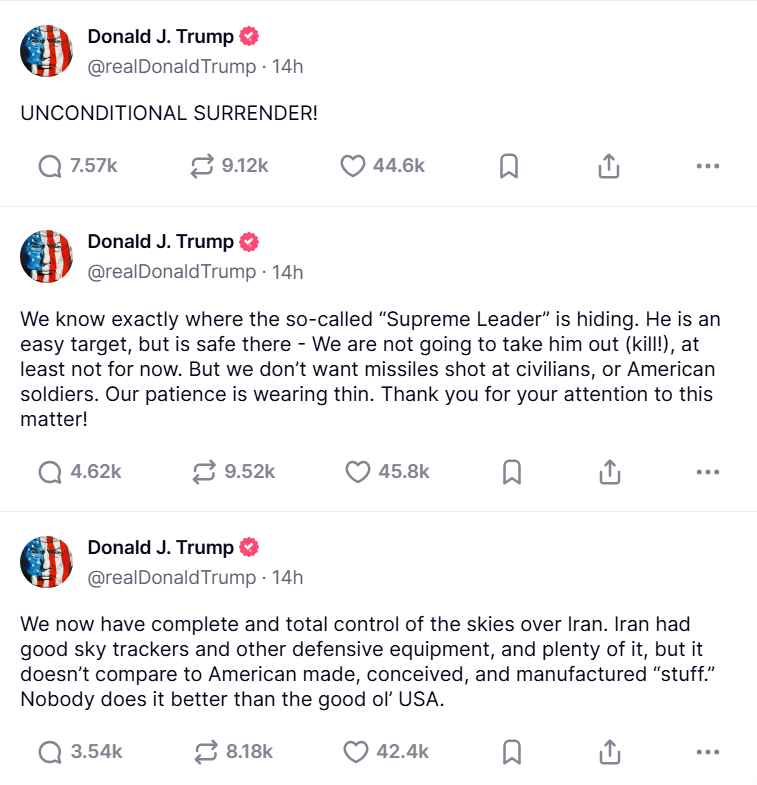Intense Middle East Conflict Triggers U.S. Warnings
The ongoing airstrikes between Israel and Iran have escalated sharply in recent days. President Trump has responded with increasingly strong rhetoric, warning Tehran that U.S. patience is waning—while leaving open the possibility of deeper military action.
These developments have raised critical questions: Is Trump going to declare war? Is Trump addressing the nation tonight to explain U.S. involvement? What exactly is meant by “unconditional surrender”, and how real is the threat from Iran toward U.S. interests?
Trump Demands “Unconditional Surrender”
On June 17, President Trump took to social media to escalate his position. He demanded “unconditional surrender!” from Iran, declaring that America has “complete and total control of the skies over Iran” and knows the location of Ayatollah Khamenei, though “no plans to kill him… at least not for now.”

Trump—who left the G7 summit early—dismissed ceasefire calls, stating, “I’m not in the mood to negotiate,” while also suggesting diplomatic channels could involve Vice President Vance or envoy Steve Witkoff en.wikipedia.org+3apnews.com+3nypost.com+3.
Iran Threatens U.S. Bases if Conflict Deepens
In response to rising tensions, Iran’s defense minister warned that any military confrontation would expand the conflict to target U.S. bases across the Middle East. Tehran has already attacked Israel with hundreds of missiles and drones, explicitly warning that U.S. and allied military installations are within striking range.
Iran’s position reportedly reflects a broader shift toward “maximum pressure” policy, combining military threats with diplomatic posturing. Officials also emphasized that fault lines now extend beyond Israel to include American military targets in the region .
Is Trump Going to Declare War?
Despite the inflammatory language, as of June 18 there has been no formal war declaration from President Trump. Congressional Republicans remain largely united behind Trump, though a growing number of Democrats—led by Senators Kaine and Sanders—are introducing war powers resolutions to prevent unauthorized military action.
Trump has reiterated that the U.S. has taken defensive, not offensive, actions, highlighting deployments intended to safeguard regional bases and Israeli forces .
Is Trump Addressing the Nation Tonight?
As of mid-June, the White House has not announced a formal “Trump address nation tonight” speech. The president has conducted a private National Security Council briefing, spoken with Israel’s PM, and issued statements online, but no planned national broadcast has been confirmed .
Israel-Iran Strikes and Evacuations
-
Israel’s air campaign against Iranian nuclear and military installations—codenamed Operation Rising Lion—has killed hundreds in Iran and drawn retaliatory missile attacks.
-
Iran has unleashed drone and missile barrages targeting Israeli cities and has threatened targeting U.S. bases.
-
Tehran has issued evacuation orders, with many civilians fleeing the city amid blackout conditions and communications disruptions.
More Implications
-
Escalation Risk: With both Iran and Israel threatening broader strikes, the conflict may expand to U.S. personnel or assets.
-
Diplomatic Red Lines: Trump’s emphasis on unconditional surrender, while dismissing ceasefires, raises questions about diplomatic space and whether war authority will be sought from Congress.
-
Domestic Constraints: War-powers proposals indicate growing resistance to unilateral escalation from Capitol Hill.
-
Public Communication: The absence of a national address leaves both American and international audiences uncertain about the U.S.’s next steps—stoking markets and global anxiety.
A Crisis in the Making
As Iran issues threats against U.S. bases, and Trump escalates rhetoric with phrases like “unconditional surrender”, there is growing anxiety about a potential U.S. military role in the Israel-Iran conflict. However, no formal war declaration has been made, nor has a Trump address nation been scheduled.
For now, it remains unclear whether Trump will declare war or simply deepen American support for Israel. What is clear is that U.S. military readiness is heightened, diplomatic pressure is rising, and Congress is preparing to push back against clandestine escalation. With regional aggression intensifying and civilian evacuations on both sides, the coming days may determine whether this is a local flare-up—or the dawn of a broader war involving the U.S.


